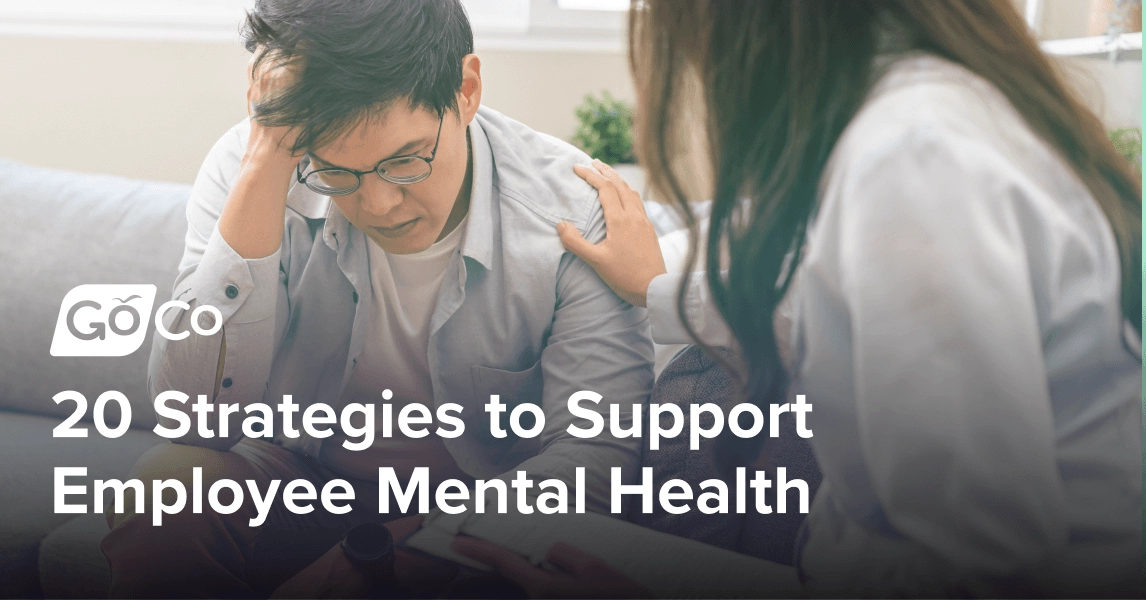20 Strategies to Support Employee Mental Health
We've gathered insights from twenty business leaders and mental health professionals on how their organizations support employee mental health.
June 4th, 2024
Understanding the critical importance of mental well-being in the workplace, we've gathered insights from twenty professionals, including Chief People Officers and CEOs, on how their organizations support employee mental health. From offering comprehensive wrap-around employee support to fostering team hangouts to unwind and connect, these leaders provide diverse strategies to promote a healthier work environment.
Creating an Understanding Culture
Establishing a company culture that prioritizes mental health can significantly impact employees' well-being. It is essential to foster an environment where open communication about mental health challenges is encouraged, reducing stigma and allowing employees to speak up and seek help when they need it.
This culture of support can lead to a happier, more productive workforce with lower stress levels and improved overall mental health. Here are some insights from experts about successfully weaving mental health support into the culture of their organizations.
1. Foster Support During Challenging Times
"As a mental health practice, we incorporate this into our culture as well. Examples include after challenging events, whether they be the loss of an employee who passed away or election stress, we create an environment that is supportive and that fosters expression.
We don't just skip over these events. We also have consultation groups to discuss clinical work as well as personal concerns. We are supportive of people using their benefits to seek mental health resources as well."
William Schroeder, Co-Owner, Just Mind Counseling
2. Cultivate a Supportive Work Environment
"Look, you can totally use all your budget on excellent mental health packages that you can offer to all of your employees. There are some awesome (and expensive) packages out there. But, in a small company, the best thing you can do is to cultivate a supportive work environment.
Practically, this starts with getting managers up to speed on your vision for prioritizing mental health. Run an 'ask me anything.'
Then you can move on to in-house training around fostering open communication, actively sharing stories in the weekly all-hands (celebrations and learnings for the week are a good place to start), reducing stigma around mental health issues, and promoting work-life balance (simple things like messaging each other when it's past 6 p.m., 'Hey, remember, work-life balance, Ben!' (P.S. It should be life-work balance, right?)
One of the easiest ways to support employees with their mental health is to revamp your 1:1s across the company. If a manager is always asking, 'How's your mental health these past two weeks?' eventually, each employee will feel like it is prioritized, and they will eventually feel comfortable talking about it. A great first step."
Ben Dowse, Head of People, SwipeGuide
3. Subsidize Mental Health Check-Ups and Breaks
"On a regular basis, we conduct employee evaluations, and when anyone on the team is not performing well, we go back to them and see if the root cause is mental health, and it is sometimes the case.
Our company supports and subsidizes mental health check-ups and mental health breaks that our team needs in order to function more efficiently as individuals and support the company at the end of the day."
Cheryll Selda, Co-Founder, Ayo! Organics
4. Practice Intention Setting and Encouraging Dialogue
"We support mental health by setting intentions before having conversations. Everyone writes down a goal and a few talking points, and this prevents meetings from devolving into unproductive events. In addition, we listen and encourage people to elaborate on what they have to say, especially with personal anecdotes.
The phrases “Say more” and “How did that feel?” go a long way with people, and they help us learn about their experiences and the most effective ways to communicate with them. It seems to me that mental health deteriorates when people are not heard, so that is where we focus."
Bill Mann, Privacy Expert, Cyber Insider
5. Promote a Positive Work Culture and Wellness
"Going all out to create a fun and safe environment at work is one way for an organization to support an employee's mental health. As the Chief Clinical Officer of a mental health facility, I believe that our organizational culture is positive and fun for all our staff.
Having stress at work increases the vulnerability of the employees, leading to burnout and low productivity. Our mental health facility works with patients dealing with substance use disorders, and we try our level best to ensure our staff are not stressed out. I believe that creating a positive work culture is necessary for supporting employees through their mental health challenges.
For example, we have a meditation room and always pay for gym memberships for our staff. These wellness initiatives have been effective in creating a positive culture for our staff."
Ashley Murry, Chief Clinical Officer, Sana Lakes Recovery
6. Use a Checklist and Bi-Weekly Staff Group Therapy
"Our organization uses a checklist of signs to keep an eye out for among our employees. If we see someone exhibiting behaviors close to, or even just related to, our list, we bring them in and ask what we can do to help support their mental health.
We also use staff groups, essentially group therapy, for bi-weekly check-ins where staff can interact with and get support from their colleagues and offer their support, too. Some of these groups are staff-run as well, since despite being aware of and accommodating to our staff members with regard to their mental health, it's still sometimes uncomfortable for staff to turn to a supervisor for support when they need it. Sometimes, it's easier to connect with a peer or colleague.
All in all, as an organization whose primary focus is mental health and well-being, our jobs are often stressful, and it's sometimes hard not to take on the stressors of our clients. It's essential for those working in mental health to have some built-in stopgaps to allow for regular check-ins with our staff."
Dr Lea McMahon, Chief Clinical Officer, Symetria Recovery
7. Provide a Culture of Psychological Safety
"Recognizing the profound impact of employee mental health on both individuals and organizational performance, we uphold our core value of Health and Safety First at NamanHR. This commitment extends to fostering a culture of psychological safety, ensuring that our employees feel secure and supported in expressing any concerns they may have at work.
While initiatives like work-life balance and flexible schedules play a role, our emphasis on psychological safety goes deeper. It means creating an environment where transparency and open communication are encouraged, allowing employees to freely address their fears and uncertainties. By providing this secure environment, similar to the comfort of home, we ensure that mental health remains a priority even within the workplace, resulting in better engagement. In doing so, we create a supportive ethos where our workforce feels valued and empowered to prioritize their well-being."
Arundhati Chafekar, Principal Consultant, Vertical Lead – Learning and Strengths, NamanHR
8. Have Regular “Wind-Down” Sessions and an Open Door Policy
"At Tax Crisis Institute, a healthy mind is just as vital as a clear tax record. One key strategy we've implemented is regular “wind-down” sessions, where team members can step away from their desks, unwind, and engage in activities that relax and rejuvenate them. These sessions range from meditation and yoga to casual coffee chats—no tax talk allowed!
Another unique approach is our “Open Door Policy.” It's not just a metaphor; my door is open. This encourages our team to freely discuss any challenges, work-related or not. We've found that creating an environment where conversations about mental health are normalized significantly boosts our collective well-being and productivity."
Dana Ronald, President, Tax Crisis Institute
9. Take a One-Team Approach to Time Off
"At ICAgile, we practice a "one-team" mentality that balances involvement, workloads, and support among team members. For instance, in some organizations, taking a vacation means that missed work piles up, which can cause added stress upon an employee's return.
However, by taking a one-team approach to time off, colleagues are motivated to cover teammates' responsibilities while they are away. In doing so, employees feel empowered to avail themselves of our flexible time-off policy without repercussions and return feeling refreshed and energized for the next challenge ahead. This balanced, collaborative approach also helps us avoid "single points of failure," which can also put undue pressure on impacted employees."
Shannon Ewan, CEO, ICAgile
Offering Employee Assistance and Benefits
Beyond instilling mental health wellness and support in your organization's culture, one of the most obvious ways to support employees is to offer helpful benefits and perks that encourage them to recharge and seek assistance when needed.
The stigma around mental health in the workplace is very real, with 8 out of 10 workers with a mental illness not disclosing it at work for fear of misunderstanding, backlash, or even the loss of their job. Here's what our experts suggest to help encourage employees to seek the help they need and properly care for their mental health.
10. Comprehensive Wrap-Around Employee Support
"As a mental health organization that is both trauma-informed and harm-reduction-oriented, we are still working to find the right balance for our employees. This year, we launched more comprehensive wrap-around support for both employees and their families, providing two visits a month at no cost.
The structure was critical to meet employees where they are and to provide multiple levels of care (from coaching to therapy), with both in-person and telehealth services. From there, we have integrated the resources of our partner into leadership development (providing tools for things like check-ins and one-on-ones) to how we approach overall well-being in a more personalized way."
Stacie Baird, Chief People Officer, Community Medical Services
11. Separate Mental Health Days from PTO
"Employee mental health is a big priority for us at Airswift. Since we're a workforce management and recruitment firm, it's doubly important that we maintain a strong culture, high retention, and high engagement—after all, if we're not able to do that for ourselves, our clients won't trust us to deliver solutions for their teams.
We have a lot of workplace policies aimed at supporting employee mental health, but I'll highlight one in particular that is a more recent addition to our policy and that I've seen have a positive impact, which is offering employees 'mental health days' that are separate from their PTO. Our policy at Airswift is that employees get three of these every quarter. They are paid days that don't need to be scheduled in advance and don't require a doctor's notice or other supporting evidence. If an employee is feeling burned out, overworked, stressed, anxious, or just generally needs a mental break, they can use one of these days, no questions asked.
I will admit I was skeptical of this policy when we first implemented it, but I've since come around to the idea. Primarily, I've noticed a benefit I didn't anticipate, which is that it has a positive impact on the overall morale of the team. By letting team members have a day to recuperate and recharge when they need it, I've found that everyone is in a better mood and ready to be productive and positive when they're in the workplace."
Rob Boyle, Marketing Operations Director, Airswift
12. Instill Preventive Measures and Peer Support Groups
"We believe in the power of preventive mental health measures and peer support. We've introduced wellness programs that include activities designed to prevent burnout, such as yoga classes, team-building retreats, and a policy that encourages taking regular breaks throughout the workday. We also facilitate peer support groups where employees can share experiences and coping strategies in a safe and confidential environment.
These groups are guided by trained facilitators, offering a platform for connection and mutual support. Through these initiatives, we aim to foster a workplace that not only responds to mental health issues but actively works to prevent them, ensuring our employees feel supported in every aspect of their well-being."
Ronnie Adamowicz, Psychotherapist, RonnieAdamowicz
13. Host Regular Workshops and Employee Assistance Programs
"At our organization, we prioritize employee mental health through various means. Firstly, we offer regular workshops and seminars on stress management, mindfulness, and self-care techniques, providing employees with practical tools to enhance their well-being.
Additionally, we have established an Employee Assistance Program (EAP) that offers confidential counseling services to employees facing personal or work-related challenges, ensuring they have access to professional support when needed. These initiatives underscore our commitment to fostering a supportive and mentally healthy work environment."
Nilou Esmaeilpour, Clinical Director and Registered Clinical Counsellor, Lotus Therapy
14. Negotiate Free Mental Health Care Coverage
"We have an outstanding Employee Assistance Program (EAP) with extensive in-person and virtual benefits for our team. Recognizing the importance and expense of mental health treatment, we also negotiated free mental health care in our 2024 health insurance renewal. The plan covers inpatient and outpatient treatment at no cost to participants, meaning there are no copays for those who attend regular therapy sessions."
Donna DeChant, Chief People Officer, AirSculpt
15. Build Zen Spaces and Comprehensive Mental Health Coverage
"As a treatment center for those with substance use disorder, it's important that our doctors remain in the best possible headspace so they can properly treat our patients. Quiet, Zen spaces and covered mental health care are two ways we sponsor and encourage good mental health for our employees.
Yes, we mean all employees. We recognize that those who aren't physicians don't have their own office or personal space to take a breather. Even witnessing treatment as intensive as substance use treatment can impact mental health.
We have soundproof rooms spread throughout our clinics at all locations. They have wellness books, crossword and regular puzzles, a yoga mat and common relaxing poses, and a couch for sitting and breathing. There's also calming music and a small rock-garden waterfall, as well as calm lighting to help an employee relax.
We also offer insurance plans with extensive mental health coverage. If you don't take care of your own mental health, you will struggle to take care of someone else's. We offer physicians and employees alike the same opportunities to meet with psychologists, psychiatrists, counselors, group counseling, or whatever else they need to ensure that their own mental health needs are met."
Abid Nazeer, Psychiatrist and Chief Resident, Symetria Recovery
16. Grant Free Access to a Mental Wellness App
"Our organization supports employee mental health by ensuring free access to a mental wellness app. We have consulted a mental health specialist and discovered the best mental wellness app. We have ensured all our employees have free subscriptions to this app. They can access the app at any time and at their convenience.
The app has several resources to support our employees' mental health. Employees can capitalize on the best tips for stress management and mindfulness exercises. Additionally, the app has meditation guides for those who want to practice meditation. After taking employees' feedback, we have concluded that the app has benefited most of our company's employees. It has enhanced their mental well-being and facilitated their productivity."
Jeremy Bogdanowicz, Founder and CEO, JTB Studios
17. Offer Wellness Programs and Tailored Insurance Benefits
"In my role overseeing the management of non-traditional boutique health insurance solutions through NPA, one key aspect we've emphasized is the mental health support for our employees. From our philosophy of creating a concierge-level experience for clients and partners, we've applied a similar approach internally to support our team's well-being. Here are two specific initiatives that have been particularly impactful.
Firstly, we've introduced a comprehensive wellness program that includes mental health as a core component. This program offers tools and resources tailored to a variety of needs, ranging from stress management workshops to mindfulness and meditation sessions. We believe in the power of preventive care, so providing our employees with these resources helps them maintain their mental health proactively. This initiative reflects our understanding of the interconnectedness between mental well-being and professional performance.
Secondly, leveraging our expertise in health insurance, we've ensured that our employees have access to top-tier mental health benefits within their insurance plans, including coverage for therapy sessions and psychiatric consultations. Recognizing that one size does not fit all in healthcare, our benefits design is flexible, allowing employees to choose the mental health services that best suit their needs. This not only underscores our commitment to their well-being but also demonstrates the potential of thoughtful insurance design in supporting mental health.
By prioritizing mental health through preventive wellness programs and tailored insurance benefits, we foster a workplace environment where employees feel supported and valued. This approach has not only enhanced our team's overall well-being but also strengthened our productivity and cohesion, reflecting the profound impact of such initiatives on an organization's success."
Les Perlson, MGA, NPA Benefits
Flexibility and Adjusting Expectations
Besides instilling mental health support in your company culture and offering supportive benefits, it is paramount to make room for flexibility and adjustments to expectations for employees. Above all, remember that you are working with humans who need empathy and understanding in times of need. Here's how experts practice work-life balance and make changes to support their employees.
18. Reduce Stress With Flexible Work Options
"Providing flexible work options is the perfect way for an organization to improve the mental health of its employees. As the CEO of a wellness company, I know that many employees struggle with burnout and stress at work.
At Neurogan Health, we believe in giving breaks and flexible working hours to our staff to reduce cases of stress and feeling overworked. Our company relies on virtual collaboration tools like Microsoft Teams and Zoom to keep in touch with our employees even when they work remotely.
Our employee turnover has reduced by a whopping 70% as many people love working in a considerate environment. I feel that giving employees an option to rest and be with their families at times improves their mental health and psyche. Organizations should avoid draining their employees until they have nothing more to give, according to most of our employees. I believe giving employees a chance to be with their families makes them happier and more productive."
Jan Brandrup, CEO, Neurogan Health
19. Uplift With Mood-Boost Mondays and Virtual Zen Garden
"Our organization promotes mental well-being through "Mood-Boost Mondays," in which employees participate in mindfulness exercises and uplifting activities. We also provide a unique "Virtual Zen Garden" platform, allowing employees to immerse themselves in peaceful locations for brief mental escapes digitally.
These initiatives encourage relaxation and stress relief, resulting in a healthier work-life balance. We foster a healthy and flourishing workplace atmosphere by putting mental health first in unique ways."
Phil Collins, Sales and Marketing Manager, Polymaster Group
20. Set Realistic Deadlines and Accessible Resources
"In our field of work, individuals have to deal with lots of responsibilities and strict deadlines, besides the complex workload. Plus, we deal with confidential information for our clients and plan acceptable financial plans for them, among other tasks. All of that can add immense pressure daily.
Thus, at our business, we try to promote a healthy balance between expectations and the available workload. Everyone involved deals with realistic deadlines and targets for their tasks. Not to mention, we can access various resources that can help with our work at any time. Having this balance provides the necessary boost to our work productivity without compromising on mental health."
Loretta Kilday, DebtCC Spokesperson, Debt Consolidation Care
Final Thoughts
Fostering a culture of mental health support in the workplace is not only beneficial for employees' well-being – it also strengthens a company's culture and success. The experts in this article suggest a variety of methods to achieve this, from building a culture of open communication and psychological safety to offering comprehensive benefits packages and flexible work arrangements. By prioritizing employee mental health, companies can create a happier, healthier, and more productive work environment for everyone.
Recommended Posts
Everything Your HR Team Needs to Know About PTO in 2025
Blog Articles
Five Best Practices for ADA Compliance
Blog Articles
Search...
Product
GoCo
Resources
Articles
eBooks
Webinars
Customer Stories









